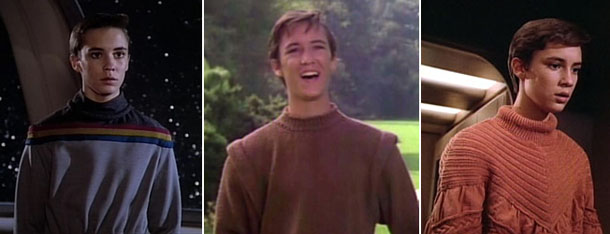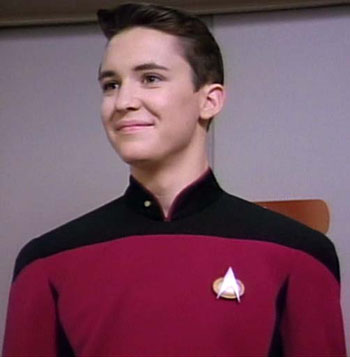Jayne Nelson argues that the Enterprise’s most notorious crewmember deserves some sympathy...

Case for the defence: Your Honour, ladies and gentlemen of the jury, I would like to open this court case by saying that this is a tough gig. I can’t deny it. “Wesley Crusher” is a name guaranteed to strike loathing into the heart of any Star Trek fan. But I’m here to change that. I’m here to argue that poor Wesley has been much maligned.
Case for the prosecution: And I’m here to argue that Wesley Crusher rightfully deserves all the derision that’s been dumped on him through the years. This could be the easiest case I’ve ever taken on!
Case for the defence: We’ll see. But before we go on, I would like to make a very important distinction: this case is about Wesley Crusher. It’s not about Wil Wheaton. In the same way that Wesley is disliked by pretty much every sci-fi fan everywhere, Wil is liked by pretty much every sci-fi fan everywhere. He’s worked hard over the years to show that he’s a cool, witty, fun guy who doesn’t deserve to be judged by the same yardstick as a character he played while only a teenager. We shouldn’t confuse the two.
Case for the prosecution: M’lud, please allow the record to show that I agree with my esteemed colleague on this. Wil Wheaton is blameless here. I even follow him on Twitter myself. The dude is awesome squared!
Case for the defence: Okay, with that established, let’s go back to Wesley. Imagine, if you will, that it’s 1987 and the brand-new Star Trek series is about to air for the first time. Star Trek: The Next Generation isn’t just for those original Trekkies who’ve been demanding a new show on their TV screens since 1969: it’s also aimed at an entirely new generation, hence the name. The old fans have their idols in a different form – Riker for Kirk, Data for Spock, LaForge for Scotty. There’s also Patrick Stewart giving it some gravitas as the new Captain, daring the critics to write this off as sci-fi fluff. But what’s in it for the kids? Who are teenagers supposed to empathise with? That’s where Wesley comes in! He’s the very first teenager on the Enterprise, a kid barely out of short trousers living the dream we’ve all wanted to live ourselves!
Case for the prosecution: Poppycock. Kids and teenagers are perfectly capable of empathising with adults or, in Data’s case, androids. The addition of a teenager to the cast was purely unnecessary. The old Trek didn’t have to worry about such nonsense, did it?
Get sneak previews, exclusive competitions and details of special events each month!
Case for the defence: But times had changed. This was a huge gamble on Paramount’s part. They had to prove that if they were going to spend so much money, time and effort on reviving this sacred show, there had to be something for everyone. It needed the widest audience possible, hence the inclusion of a younger character. And whaddya know – it got that audience. It was a huge success, to the tune of seven excellent seasons.
Case for the prosecution: Bearing in mind the fact that Wesley was all but written out after season four, that’s probably not the best argument in his favour.
Case for the defence: He was still popular enough to turn up in several more episodes, though. It wasn’t as if the writers said, “Never darken our door again!” Clearly he had his fans, and they wanted him back.
Case for the prosecution: If your Honour doesn’t object to me projecting my own theory onto this, I would argue that his further guest-star appearances were actually the writers, still smarting from his reception, trying to correct past wrongs and show us that he was a valued and loved member of the crew despite the backlash against him. But it didn’t work. He was still annoying. In fact, I’d like to present my biggest argument against Wesley Crusher now: his unutterable arrogance .
Case for the defence: He wasn’t arrogant! What are you talking about?
Case for the prosecution: Of course he was arrogant. He couldn’t help it. His very existence was arrogance. Wesley was written in a way that implied he was better than anybody else on the Enterprise. He was a child prodigy, someone the mysterious Traveler said was “like Mozart”. He could out-engineer the ship’s Chief Engineer; he could out-programme Data; he could outsmart aliens and save the ship every bloody week...
Case for the defence: Actually, that’s not true. It’s a myth that he saved the Enterprise every episode. He only did it a couple of times overall.
Case for the prosecution: He shouldn’t have been doing it at all! He was introduced, as you said, to be someone the younger audience could identify and empathise with... but how the hell could Sarah and Simon Smith from Milton Keynes ever empathise with someone their age who was such a genius he knew more than the rest of the crew? Newsflash: NOBODY LIKES A SMARTARSE!
Case for the defence: Aww, but he wasn’t just a smartarse. He had a sad life! His dad died, his mum treated him like a big kid instead of an adult – and that was whenever she wasn’t too busy working – and he kept messing up his academic studies. He didn’t have everything handed to him on a platter. He had a lot to contend with.
Case for the prosecution: You didn’t mention those jumpers. Even I feel sorry for him for having to contend with those.

Case for the defence: The poor guy wasn’t exactly responsible for what the Next Generation costume department inflicted him with. Don’t forget what poor Troi had to wear until they sorted her out. Plus, see how much better Wesley looked in his eventual Starfleet uniform!

Case for the prosecution: I think it’s time I cut to the chase. We’ve been sidestepping two important issues here. Firstly, that Wesley Crusher was a Mary Sue. He was placed on board the Enterprise to personify Gene Roddenberry himself – something the great man even confirmed in interviews. He was an avatar so that Roddenberry could exist on the Enterprise, and even had the same middle name, Wesley. That is nothing if not annoying.
Case for the defence: Oh, come on. Without Gene Roddenberry there’d be no Star Trek . You can’t deny the guy a chance to live vicariously through a character supposed to be him. It’s actually rather endearing – after all those years, he was on the Enterprise at last!
Case for the prosecution: But making his alter ego a genius ? That’s a bit pompous, isn’t it?
Case for the defence: Wouldn’t you give your alter ego a tweak and make him smarter than you? Or more handsome? Or sexier? Everything you want to be but aren’t? That’s the whole point. It’s a fantasy.
Case for the prosecution: But he just got worse and worse, even after Roddenberry’s death. Which brings me to my second point: in his last appearance, “Journey’s End”, we discover that Wesley has bloody superpowers. He’s not just a genius with computers; he’s a flippin’ alien mutant or something! So much for audiences identifying with him!
Case for the defence: It was merely tying off a loose end from season one, when the Traveler said he was special. This is science fiction, after all. Humans don’t have to stay humans. It’s interesting that Wesley becomes something more – it explains a lot about him.
Case for the prosecution: Nope. Having a character’s “specialness” thrust down your throat time and again simply ends up making you choke. It’s as though the writers decided they’d had enough of trying to convince us Wesley was “special” by his ordinary behaviour and resorted to cheap tricks. Funnily enough, something similar happened to Kes in Voyager. That went down like a lead balloon as well.
Case for the defence: You’ve highlighted a lot of things about Wesley that are bad. He did have his good points. Have you seen “Final Mission”?
Case for the prosecution: You mean the episode where he’s stranded on a planet with an injured Picard? The one where he – gasp! – saves Picard’s life using nothing but his genius?
Case for the defence: If you want to look at it like that, yes, it does sound corny. But if you actually watch it... There’s a really lovely interplay between Picard and Wesley that could have been built on a lot more in the show. Picard was a father figure for Wesley and, in return, Picard almost saw him as a son. You don’t really see it anywhere else, or if you do it’s a bit forced, but it works very well here. Wesley’s not annoying at all in “Final Mission”, and it’s an extremely satisfying episode. It softens him. It’s him being his usual computer geek self but using it for an emotional reason for once. Perhaps if Wesley had been written like this all the way through the series instead of as the cocky, irritating kid showing up all the adults, he would have had more fans.
Case for the prosecution: But he wasn’t. I’m afraid your defence must rest here: Wesley Crusher sucked. He’s just as hated today as he was in the late ’80s and early ’90s. See this? That’s the legacy of Wesley Crusher, I’m afraid.
To sum up for the court: You can’t polish a nerd.
SFX Magazine is the world's number one sci-fi, fantasy, and horror magazine published by Future PLC. Established in 1995, SFX Magazine prides itself on writing for its fans, welcoming geeks, collectors, and aficionados into its readership for over 25 years. Covering films, TV shows, books, comics, games, merch, and more, SFX Magazine is published every month. If you love it, chances are we do too and you'll find it in SFX.


